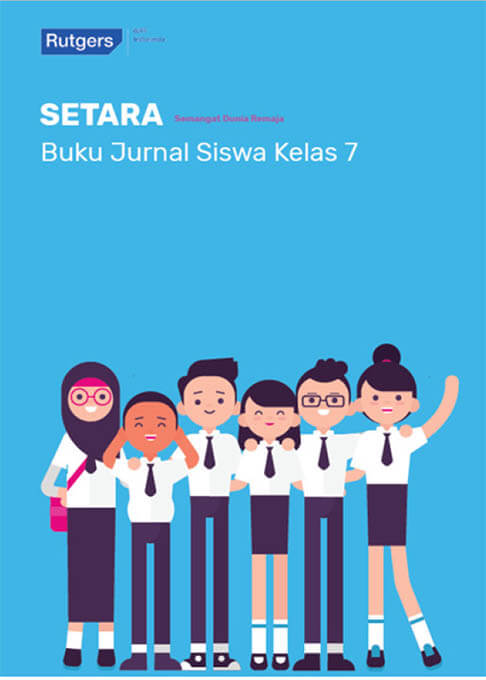
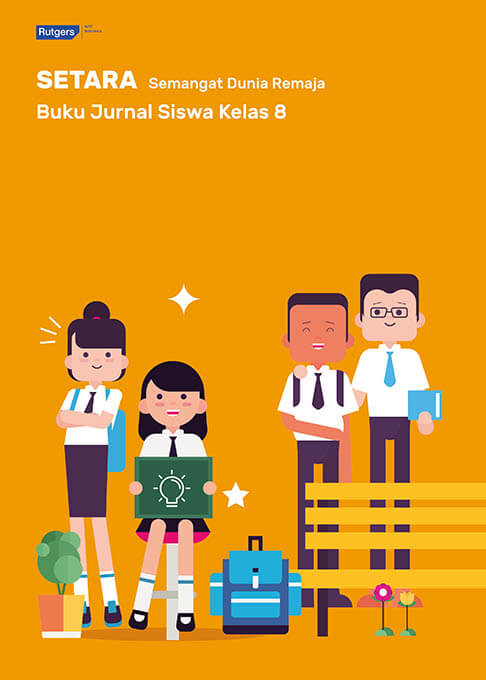


The absence of reproductive health lessons created a chain reaction impacting young people and their environment. An intermediate school teacher from Bandar Lampung, Sri Mulyani, or Ani, received a number of reports from local residents that her students often threw their menstrual wastes across the school fence, to a plot of land behind their school.
“Our school received a number of protests by the locals. So behind our school, there is a fence, the girls during their period, they have no idea how to dispose (the sanitary pads), thus they threw it across the fence,” Ani told us.
Another problem that she encountered was clogged school toilets, because her students were flushing their menstrual pads down the toilets. Ani assessed that this series of problems happened due to the lack of lessons on Menstrual Hygiene Management (MHM), that is part of reproductive health education.
Not only that, the absence of reproductive health knowledge has other impacts; starting from high number of unwanted pregnancy cases, child marriage, and students dropping out of school. An intermediate school teacher from Semarang, Anita Rakhmi Shintasari, told us that these problems are prevalent in her school.
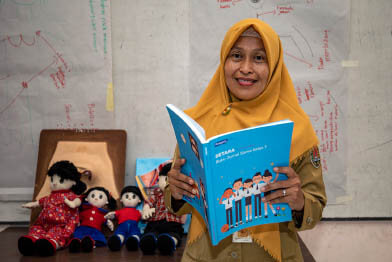
“There are often cases of students dropping out of school. Their reasons were very diverse; some were less motivated to study, some had poor self-concept, some entered the wrong clique, and we found several students dropping out of school due to them getting married early,” Anita explained.
Teenagers experience a lot of changes during their puberty, be it physical, hormonal, or emotional changes; and naturally they’ll start to feel the inclination to build a romantic relationship. According to her experience, Anita found several cases in which students’ relationships with others ended up affecting their performance as well as their health.
“Some example of the cases, there was one student saying that they would commit suicide after breaking up with their lover, there was one who ran away from home, following their lover. Most of the time, the ones doing these are the girls; and the majority of them were in the 9th grade when these problems started to appear,” Anita told us.
Lessons on what a healthy relationship should look like and how to regulate emotions are inseparable from reproductive health education. All of these lessons are incorporated within the SETARA program/module that Anita first encountered in 2017.
“From here, I decided to dedicate myself, starting with students in the 7th grade, so that I can anticipate those problems. Although I might not be able to reach all students, at least when providing education to vulnerable children, we can help reduce the number of students dropping out of school,” Anita said.


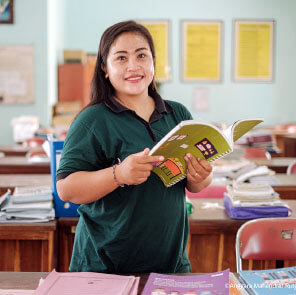
“Before being exposed to the topic of gender, I always say that the class-rep should be a boy and the secretary should be a girl. So without realizing it, we are reproducing those stigmas,” Bintang told us when reminiscing about his time studying gender equality through the SETARA module.
“So my understanding and my values changed, after that I taught my students that we are all equal, men and women, everyone has rights, respect them, they have equal opportunities too,” Bintang continued.
During the training, Bintang realized that there were many things that had never been taught to him when he was a teenager. One of the topics that he remembers the most is dating violence, a problem that he witnessed happening during his teenage years.
“I felt, why didn’t they teach me about this back then? For me, the training was filled with flashbacks,” according to Bintang.
Since then, Bintang has been committed to take an active role as an educator, imparting knowledge on those topics to his students. He doesn’t want his students, his “second children,” according to him, to navigate blindly through their teenage years, and experience impacts that they have never imagined before. Bintang wants them to get acquainted with and understand their own self, to have what it takes to make their own life choices.
Bintang told the story of his journey while studying the SETARA module through his writings; and he hopes to compile them into a book. His writings tell the story of how his thought process was changed, especially related to reproductive health and gender values.
“So I think as a teacher, I want to be part of my student’s journey in facing their teenage years, so they won’t end up like me, like ‘where should I tell my stories to? Where should I ask this question?’, it’s not like we can always ask Google to answer our questions right,” Bintang expressed.
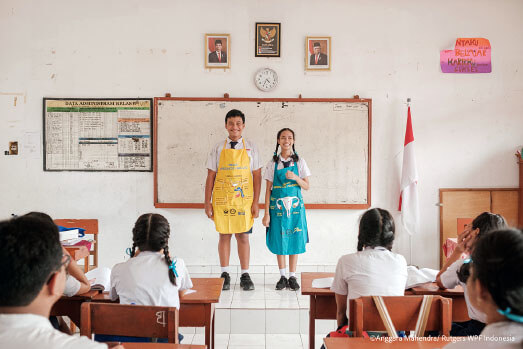
After learning the SETARA module, the teachers obtained new approaches and perspectives that are quite different, to help them teach and solve student’s reproductive health problems. Reflecting upon Anita’s experience as school counselor, she said that her teaching approach indeed, has changed.
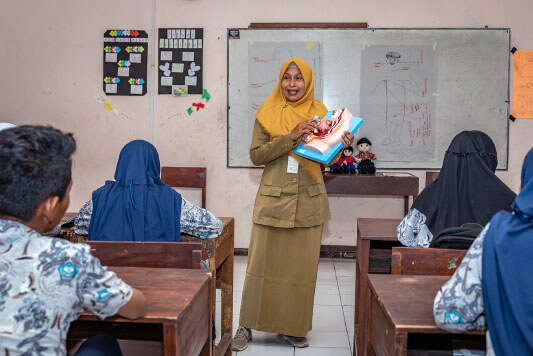
“Back then as a school counselor, I mostly did lectures in front of the classes, and I think children consider this method to be boring,” Anita explained.
“After coming back from the training (SETARA), I found several game activities that can be incorporated into the learning process for the students. Starting from that point, our relationship grew closer and my students started to become more open when it came to telling their stories, there was a space for an interaction to be built,” she continued.
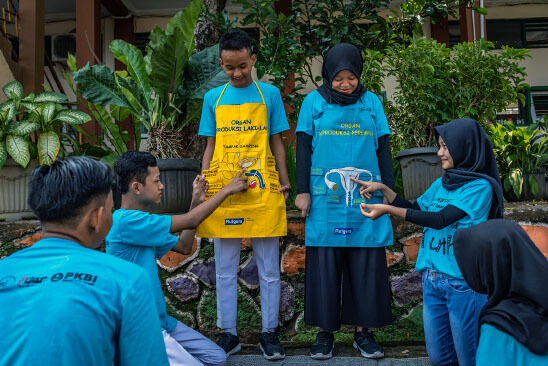
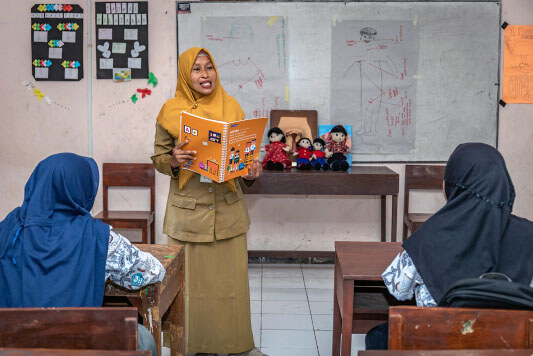
Problem-solving approaches were shifted, they now put more attention towards the rights of the children. One of the examples is the approach in solving reproductive health-related problems, such as unwanted pregnancies and many more.
“The resolution process is different now, compared to the times before SETARA. Now at school, the better way to talk about these problems is to make use of the counseling sessions,” Anita told us.
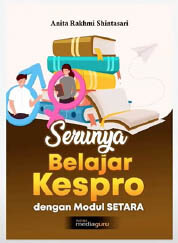
Anita’s journey in providing assistance to her students is compiled in a book titled ‘Learning Reproductive Health is Fun with SETARA Module’ – a book written by her. In her book, she says that there’s no need to consider adolescent’s reproductive health as something taboo anymore. Just like the adults, young people have the rights to ask and discuss matters related to sexual and reproductive health, in order for them to understand the changes happening to their bodies.
“Incomplete delivery of information and knowledge on reproductive health might mislead teenagers, as well as creating problems for them,” Anita explained while telling us the content of her book.
Various problems that were once under the radar are now being highlighted, due to the knowledge that the teenagers have. For example, Anita explained that when a student is experiencing sexual violence or harassment, usually they’ll remain silent. The thing is, they might have no idea about what constitutes a violence or harassment; they might even think of it as something normal; or even feel embarrassed of it. Meanwhile, after receiving the lessons, they became aware of what is right and what is wrong, they now know the steps that they need to take.
“So there was a female student, her breast was groped by a male student from the next class. Before, if it happened, the victim usually remained silent due to the embarrassment. But since she received lessons from SETARA in her 7th grade, she has the courage to speak out, to tell what happened to her,” According to Anita, the writer of ‘Learning Reproductive Health is Fun with SETARA Module’ book.
“Back then she told me directly what happened, so we were able to immediately resolve the problem for both the victim and the perpetrator [. . .] When the students stumble upon something improper, they have the courage to tell us without worrying [. . .] it’s like they have the power to speak out,” she addressed.
Similar thing was experienced by Ani; she observed that the number of problems in her school have been significantly reduced, especially problems related to MHM. Aside from that, there is also a decrease in bullying cases, after the students received lessons on the topic of bullying.
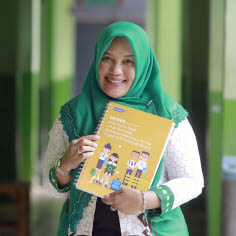
“When discussing the topic of bullying, students felt related to the topic, they were made aware that the things that happened to them were in fact, forms of bullying that they were not aware of, both as victims and perpetrators,” Ani explained.
During the discussion on that topic, one of her students told Ani, “I have no idea that calling my friend ‘fatty’ is considered [to be part of bullying], because of their plump stature. I thought it was a harmless joke. But it’s indeed a form of bullying”.
Based on her experience, Anita considers providing reproductive health education as an important intervention, a crucial step that must be taken. Because most of the time, the root behind the problem faced by adolescents is ignorance.
“I feel that this is important to be taught to students because these are knowledge that are directly linked to their lives; it’s their provision to live a healthy life in the future,” Ani stressed.
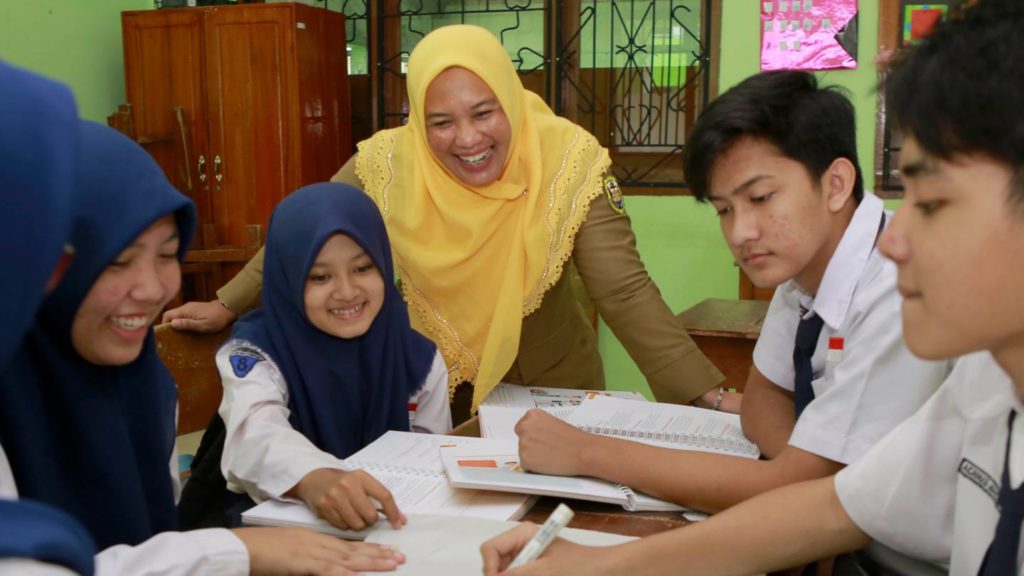
In her nine years of experience delivering lessons on reproductive health, Ani experienced a number of challenges. The biggest challenge she faced was the ignorance of her students and the various people within their social environment. With that, it seems as if there is a clash of values between what is taught by the school and by the student’s social environment at home.
“For example, about gender [equality] and bullying, students are experiencing and seeing it firsthand. So the clash of values is very apparent for these children. For example, we teach them to avoid being the perpetrator and victim of gender inequality, violence, or bullying, but when it happens to them, to whom should they tell their stories to?” Ani explained.
Even so, Ani emphasized that providing children with knowledge is the first step towards important changes. At least, children will have the resources for themselves to build a better future. However, in the future, Ani considers it important to involve parents in providing these lessons. The goal is to create a wider environment with a good reproductive health perspective.
“We also need to think about the parents or the adults as well, so that when children feel there is something they want to discuss, it matches with what is needed and what should be provided to children,” she said.